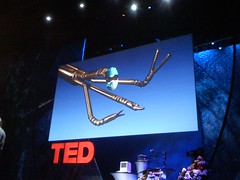 With governments around the world developing economic stimulus packages and high level meetings of the world’s leading politicians (Davos) and thinkers (TED) – there is clearly a lot of activity and talk around growth, innovation and productivity. In amongst all this – how do we, as leaders, choose what and who to listen to? What is our filter for the torrent of information?
With governments around the world developing economic stimulus packages and high level meetings of the world’s leading politicians (Davos) and thinkers (TED) – there is clearly a lot of activity and talk around growth, innovation and productivity. In amongst all this – how do we, as leaders, choose what and who to listen to? What is our filter for the torrent of information?
On the one hand we have TED, the Technology, Entertainment and Design conference, which brings together a raft of experts from across the broad spectrum of enterprises. And even if we cannot attend in person, the TED Talks series makes these fascinating and highly addictive discussions available to anyone with an internet connection. But how do we take this to another level? How do we move from ideas and talk to action?
Umair Haque has given this some thought and has written a Smart Growth Manifesto. His manifesto suggests that we have to reboot capitalism. And he provides four pillars around which action can be built. I have attempted to take these four pillars and apply it to the business of leadership and the challenges and opportunities that these present, as follows:
1. Outcomes not income. There is no surprise for my regular readers here – I strongly believe in focusing on outcomes. In this instance, the focus is on tangible human outcomes. This means looking beyond the dollar value. If it takes a village to produce good business outcomes, what is it, that we as leaders can do to ensure the village is happy, healthy, innovative, productive and creative? How do we find ways to authentically create value for our teams and our businesses?
2. Connections, not transactions. As leaders we will know where most of the creative hotspots are in our organizations. But we won’t know all of them. This is where the village comes in. Where does innovation hide within your business? Which project team is stimulating ideas that drive downstream innovation? Where are the outliers in your business that need your help to forge the connections that will prove valuable over the horizon thinking?
3. People, not product. Reinforcing the points above, a renewed focus on mobilizing the creativity trapped within your business will deliver outcomes. The thing to remember – people love to connect and create. Talk to them about the challenges your business faces and ask them for their best ideas. Give them direction, some guidelines and support their efforts. Your best people will produce the best product.
4. Creativity, not productivity. The answer to our challenges is not necessarily more product. We need to reframe the way that we look at our value propositions. Rather than supplying a market, why don’t we create a market? Working faster, producing more with less and so on will not transform our businesses or make our teams more resilient to the economic cycle. Working creatively and redefining the nature of what we do is, perhaps, one of the greatest challenges that leaders face in the period ahead.
Nina Nets It Out: Large and small organizations are wrestling with these challenges – and reinventing ways to grow. These four pillars focus on value creation. By identifying opportunities where you can impact the sustainability and resilience of your business, you will
I would add “Don’t fear failure.” It’s an undercurrent throughout your four points anyway, but failure is obviously going to be part of the creative process. Remember to support the people if they tried their hardest at something new (no matter what they manage to produce, or fail to produce). Bob Sutton wrote an enlightening post about failure in his blog today. http://bobsutton.typepad.com/my_weblog/2009/02/reward-success-and-failure-punish-inaction.html
Hi Hayli,
Thanks for your comment and worthwhile addition to my list of four pillars. I am a true believer that failure is a prerequisite to invention and innovation and is not only acceptable, but rewards us with lessons we could not otherwise have learned. I wrote about this notion in an earlier entry here:
http://ninasimosko.com/blog/ill-have-the-gain-please-hold-the-pain/
Also, thanks for sharing Bob Sutton’s piece on this topic. It is an excellent entry and I encourage my readers to click over and have a read themselves.
Refreshing point of view! So glad you’re writing on these topics. I will refer back often.
Hey Leah,
Thanks for the kind words and the readership! I always welcome your feedback.
Hey, cool tips. I’ll buy a bottle of beer to that person from that forum who told me to go to your site 🙂